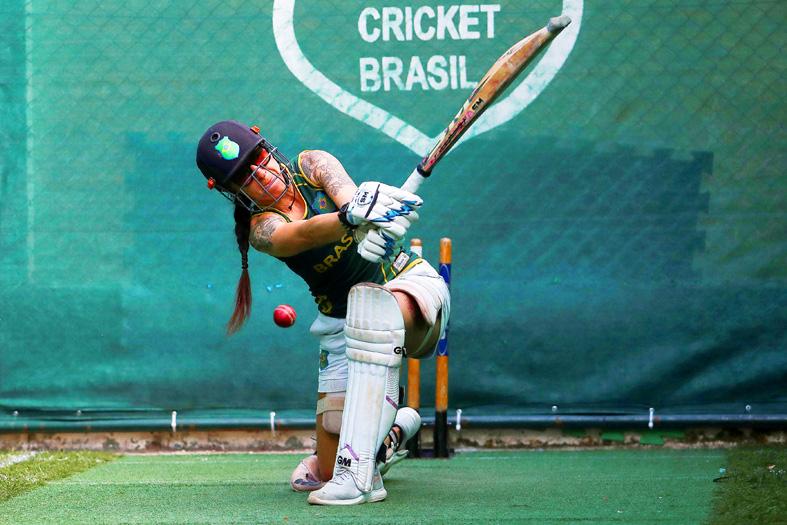When Brazil’s rapidly growing cricket program threatened to run out of bats, the solution was both simpler and harder than anyone anticipated: Make your own.
Matt Featherstone, a former England amateur cricketer who is president of Cricket Brazil, approached carpenter Luiz Roberto Francisco with a traditional bat made of English willow and asked him if he had the wood or expertise to make something similar.
Francisco, who was used to making chairs and cupboards out of medium-density fiberboard, was initially flummoxed.

Photo: Reuters
“I almost gave up lots of times. It’s really complicated,” he said. “We need time, lots of patience. There are lots of obstacles: It’s the handle, the cut, the wood, the machining. It’s not a piece that you put in the lathe and turn it and then it’s finished.”
The finished bats are in the hands of young cricketers in Pocos de Caldas, a small city in central Brazil.
Francisco has turned his workshop into a bat factory, making bats from pine, cedar, eucalyptus and other woods.
He has so far produced 80 bats and expects to ramp up production after the COVID-19 pandemic.
Pocos de Caldas has more than 5,000 young people who are taught cricket in the city’s 50 schools, playing mostly the T10 and T20 formats.
Since cricket missionary Featherstone moved there 21 years ago, he has convinced the mayor to build two training centers with nets and bowling machines, where young players can learn.
The sport has grown considerably over the past few years — especially among female players — and Brazil’s women’s teams have won four of the past five South American championships.
In the past, generous donations of bats, pads and balls recycled from professional games and sent over by the Lord’s Taverners, a leading cricketing charity in the UK, kept the Brazilians supplied.
With an increasing number of youngsters learning about yorkers, square drives and silly mid-offs — not to mention a pandemic that brought travel to a halt — a longer-term solution was needed.
“It was fine bringing in 15 or 20 or 30 bats to Brazil for a limited amount of people that play cricket,” Featherstone said. “Now we’ve got more than 5,000 young people in the development program with the idea — as soon as COVID-19 goes — of going to 33,000. That’s going to be impossible bringing bats or material for overseas, so we have to source it here. So therefore, why not make our own cricket bat factory?”
The imported willow bats would still be used by the top players, but the children’s and youth teams would increasingly use Francisco’s bats to hone their skills, one of which has become known as “the Brazilian shot,” an innovative drive that involves a 270-degree pivot to meet a leg side delivery, which has become a Brazilian specialty.
However, the search is on for a wood that would rival or even surpass English willow, and Featherstone is optimistic that a sustainable option is to be found in Brazil, a nation with more species of tree than anywhere else on the planet.
“I think we’ll find something as good as English willow,” he said.

The Cleveland Cavaliers on Tuesday emphatically got back to winning ways in the NBA, coasting to a 109-94 victory over the New York Knicks as their recent star signing, James Harden, scored 20 points. The Cavs took the lead barely a minute into the game with an Evan Mobley three-pointer and never gave it up in a thoroughly comfortable night for the red-hot Ohio franchise. Former NBA Most Valuable Player (MVP) Harden, who was brought in from the Los Angeles Clippers this month, has never won a championship, despite being one of the most decorated players in the league. That was a key

Fenerbahce on Thursday earned a rare 2-1 win in England, but were still knocked out of the UEFA Europa League by Nottingham Forest in the playoffs. Forest entered the second leg with a healthy 3-0 lead from the opener in Istanbul — where Vitor Pereira made an impact in his first game in charge — and that proved enough to advance to the round-of-16 with a 4-2 aggregate score. The result was a boost for Forest, struggling at 17th place in the Premier League, in their return to Europe after three decades. They next face Real Betis Balompie or Kerem Akturkoglu gave Fenerbahce

LATE RALLY FAiLS: Jalen Duren led a late Detroit Pistons fightback, but it ultimately fizzled as a resolute San Antonio Spurs saw out the game Victor Wembanyama on Monday led a defensive masterclass as the San Antonio Spurs outmuscled the Detroit Pistons 114-103 in an intense and aggressive clash between the NBA’s two most in-form teams. Sitting second in the Western Conference, the Spurs were pushed hard for their ninth straight victory by the East-topping Pistons, who had entered the home court matchup on a five-game winning streak of their own. Defenses dominated the first meeting between the two sides this season, with Wembanyama making six blocks and 17 rebounds to fuel transitions as the Spurs pulled clear in the latter stages. While the Pistons’ shooting was at

HAT-TRICK: In the other games, Newcastle United and Leverkusen also advanced, as did Atletico Madrid, with Alexander Sorloth scoring three goals What a difference a year makes. Or nine months to be precise. Last season, Inter reached the UEFA Champions League final in style, with thrilling victories over Bayern Munich and Barcelona, but on Tuesday, the Italian giants limped out of the competition with a disappointing 2-1 loss at home to Bodo/Glimt — knocked out in the playoff round 5-2 on aggregate — in what is being labeled as one of the biggest upsets in Champions League history. It was not the first major upset the tiny Norwegian team have pulled off this season after wins over Manchester City and Atletico Madrid, and